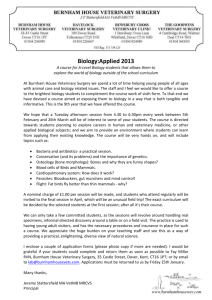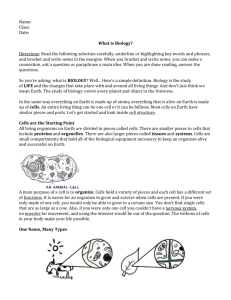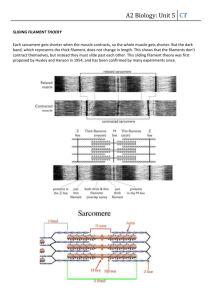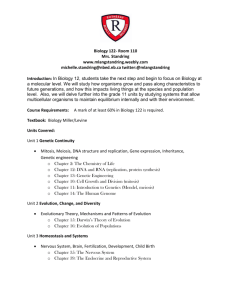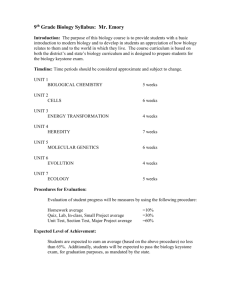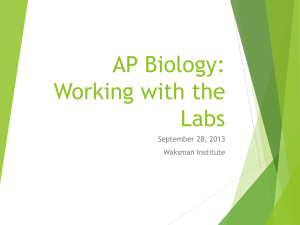Bio 100 text syllabus.doc
advertisement
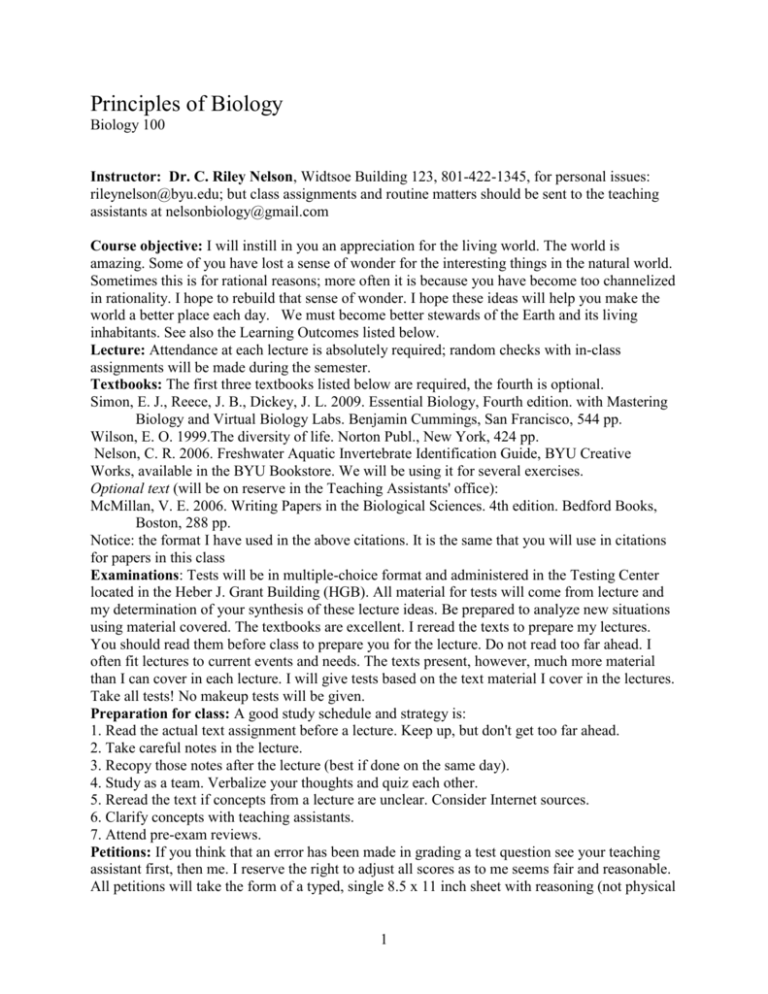
Principles of Biology Biology 100 Instructor: Dr. C. Riley Nelson, Widtsoe Building 123, 801-422-1345, for personal issues: rileynelson@byu.edu; but class assignments and routine matters should be sent to the teaching assistants at nelsonbiology@gmail.com Course objective: I will instill in you an appreciation for the living world. The world is amazing. Some of you have lost a sense of wonder for the interesting things in the natural world. Sometimes this is for rational reasons; more often it is because you have become too channelized in rationality. I hope to rebuild that sense of wonder. I hope these ideas will help you make the world a better place each day. We must become better stewards of the Earth and its living inhabitants. See also the Learning Outcomes listed below. Lecture: Attendance at each lecture is absolutely required; random checks with in-class assignments will be made during the semester. Textbooks: The first three textbooks listed below are required, the fourth is optional. Simon, E. J., Reece, J. B., Dickey, J. L. 2009. Essential Biology, Fourth edition. with Mastering Biology and Virtual Biology Labs. Benjamin Cummings, San Francisco, 544 pp. Wilson, E. O. 1999.The diversity of life. Norton Publ., New York, 424 pp. Nelson, C. R. 2006. Freshwater Aquatic Invertebrate Identification Guide, BYU Creative Works, available in the BYU Bookstore. We will be using it for several exercises. Optional text (will be on reserve in the Teaching Assistants' office): McMillan, V. E. 2006. Writing Papers in the Biological Sciences. 4th edition. Bedford Books, Boston, 288 pp. Notice: the format I have used in the above citations. It is the same that you will use in citations for papers in this class Examinations: Tests will be in multiple-choice format and administered in the Testing Center located in the Heber J. Grant Building (HGB). All material for tests will come from lecture and my determination of your synthesis of these lecture ideas. Be prepared to analyze new situations using material covered. The textbooks are excellent. I reread the texts to prepare my lectures. You should read them before class to prepare you for the lecture. Do not read too far ahead. I often fit lectures to current events and needs. The texts present, however, much more material than I can cover in each lecture. I will give tests based on the text material I cover in the lectures. Take all tests! No makeup tests will be given. Preparation for class: A good study schedule and strategy is: 1. Read the actual text assignment before a lecture. Keep up, but don't get too far ahead. 2. Take careful notes in the lecture. 3. Recopy those notes after the lecture (best if done on the same day). 4. Study as a team. Verbalize your thoughts and quiz each other. 5. Reread the text if concepts from a lecture are unclear. Consider Internet sources. 6. Clarify concepts with teaching assistants. 7. Attend pre-exam reviews. Petitions: If you think that an error has been made in grading a test question see your teaching assistant first, then me. I reserve the right to adjust all scores as to me seems fair and reasonable. All petitions will take the form of a typed, single 8.5 x 11 inch sheet with reasoning (not physical 1 or social excuses) for your answer, supported by documentation from our notes and our texts. These petitions will be duly filed in my office, but not read unless the points missed could really be important for your grade. I will judge at the end of the semester. If you are on a border-line, I will read them then. Teaching Assistants: Their main office is WIDB 198. They can be reached by email at: nelsonbiology@gmail.com. They may post more contact information on our Blackboard site. Grading: Tests will be scored by the Testing Center. The Nature Experience Proposal, Nature Experience, Biodiversity project, Virtual Biology Labs, and Serendipity writings will be graded by your teaching assistant. Your teaching assistant may also assess your participation in the extra discussion sessions and use that information in border-line grade situations. Dr. Nelson will determine final grades using the following: Nature Experience Proposal: 5% Class learning Nature Experience 10% Serendipity writings 10% Virtual Biology Lab writings 10% Test One: 15% Test Two: 15% Final examination: 15% Choice of Nature Experience: 20% In classes of this size, and based on my experiences with this and similar courses, the average for the first test will be about 85%, the second 80%, and the third 80%. I expect a standard deviation for each test to be near 10%. I do not intend to adjust a frequency curve for the class. If all students get above 93%, then each student will get an A grade. I do not expect this to happen so I will generally follow this design: 93-100% A 73-77% C 90-92% A70-72% C88-89% B+ 68-69% D+ 83-87% B 63-67% D 80-82% B60-62% D78-79% C+ Below 60% E I offer no opportunity for extra credit. Take tests and turn in assignments on time. Late assignments will be penalized a minimum of 10%. I will not post grades. You can check with the University for your final grade. Good citizenship and following the Honor Code includes no plagiarism, sexual harassment, or cheating in all its forms. Be good and make the world a better place. 2 Biology 100 Learning Outcomes Purpose The purpose of Biology 100 is to help you as a student to develop character traits, intellectual abilities, and basic literacy in the biological sciences to “think clearly, communicate effectively, and act wisely” (The Value of a General Education, BYU) as stewards and citizens in your homes, communities, and the world. Learning Outcomes The following learning outcomes represent a framework to help harmonize teaching strategy, learning activities, and learning assessments within each Biology 100 instructor’s course. All biology instructors have agreed to use this system. My course, Dr. Nelson’s course, will help you reach these Learning Outcomes. On my tentative schedule of lectures, the “time” syllabus, you will find how the following Learning Outcomes align with course activities. I will use the numbering system under Acquire, Exercise, and Accept on that syllabus to help you understand why we do the various learning activities we do, for example: Exercise 2 means the section below that reads, “2. Develop intellectual abilities and character traits of sound judgment and effective communication*.” Acquire basic literacy in the language of science and biology Students will be able to: 1. Explain the foundational assumptions underlying science and evaluate the strengths and limitations of science as a human endeavor. 2. Describe basic principles and concepts of biology using appropriate vocabulary. 3. Describe data represented textually, numerically, and graphically, and infer a conclusion from the data. 4. Plan and perform a simple experiment, actual or simulated; draw conclusions, and; communicate the results. Exercise sound scientific reasoning Students will be able to: 1. Evaluate scientific evidence and claims at the level of a well-informed layperson in order to make rational decisions on public-policy science issues. 2. Develop intellectual abilities and character traits of sound judgment and effective communication*. Accept responsibility for personal and public stewardship Students will be able to: 1. Integrate sound scientific reasoning with reasoning and methods from other disciplines to address real-world biology-related issues and concerns. 2. Reflect on how literacy in biology and sound scientific reasoning combine with reasoning and methods from other disciplines to increase their ability to act responsibly as stewards and citizens in their own families, communities and the world. 3 Definitions 1. Foundational assumptions of science are 1) The natural world is real (materialism), 2) natural phenomena have natural causes (naturalism), 3) natural laws operate everywhere and at all times (uniformitarianism), 4) natural law is independent of personal beliefs, revelations, or authority (empiricism), and; 5) natural laws are discoverable by human reason (rationalism, humanism, see also logical positivism). 2. Basic literacy: Understanding major tenets of biology (such as central dogma, cells, organism, species, ecosystems, evolution) and appropriate vocabulary at the level of the well-informed layperson. 3. Well-informed layperson: The well-informed layperson is defined as one who can read and understand non-technical articles or sections (such as the abstract and conclusions) of biology-related articles in interdisciplinary journals and magazines such as Science, Nature, Proceedings of the National Academy of Sciences, Cell, and other science-related media. Resources for the Instructor 1. Program manager. The program manager, Stephanie Burdett, is available to help you plan your course, and to find out what resources are available through the department and GE. Contact Stephanie at 2-4339. 2. Center for Teaching & Learning. The Center for Teaching & Learning can assist you in writing learning outcomes, planning your course, evaluating alignment, producing instructional materials, and evaluating the implementation of the course. Contact Richard Swan as 2-9346. 3. University librarian. Betsy Hopkins is the science librarian for the Harold B. Lee Library. She can assist you in developing library resources for your course. Contact Betsy at 2-6777. Resources for the Student 1. Instructor. 2. Teaching Assistants. 3. Librarians. 4. Textbooks, assigned readings, and exploration of concepts on the internet. 5. Biodiversity explorations. 6. Personal scientific explorations, “The Nature Experience.” * as outlined in the BYU AIMS and the GE foundation document: Scientific Principles and Reasoning: Biological Science, Physical Science, and Social Science 4



